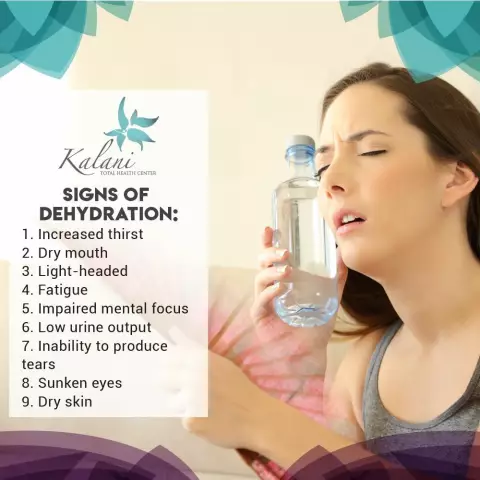- Author Rachel Wainwright wainwright@abchealthonline.com.
- Public 2023-12-15 07:39.
- Last modified 2025-11-02 20:14.
Dehydration of the body

Water is the second most important substance after oxygen, essential for chemical and metabolic processes in the human body. That is why dehydration of the body can provoke the occurrence of various diseases and pathologies. Against this background, various endocrine, cardiovascular, muscle and mental diseases develop.
Causes of dehydration
Dehydration of the body is primarily due to the excess excretion of water from it in comparison with its intake. Lack of water provokes the emergence of a variety of diseases. For example, water lubricates joints, participates in the processes of digestion and respiration, since the human lungs need continuous hydration in order to free the blood from carbon dioxide and saturate it with oxygen.
Basically, dehydration of the body occurs due to the dry air that enters the lungs. The first reaction to this is increased urination, which means a significant loss of not only fluid, but also sodium chloride, which leads to disturbances in water-salt metabolism.
Blood that has lost the required amount of water decreases in volume and begins to circulate more slowly, which leads to excessive stress on the heart. Thus, the body loses its ability to get rid of excess heat in hot conditions and distribute it in cold weather.
It has been established that the body needs up to 3 liters of fluid per day to maintain water balance, and this amount increases in the hot season. Therefore, its deficiency can provoke dehydration. If the air temperature exceeds + 35 ° C, the human body begins to heat up, especially with any physical activity. Maintaining a normal temperature and getting rid of excess heat is achieved through perspiration. During this process, a person loses a lot of fluid, which must be restored. If the renewal of the required amount of moisture does not occur, such losses lead to its deficiency.
The main reasons for the lack of water in the human body are:
- Intense sweating;
- Increased urination;
- Severe nausea and vomiting;
- Acute diarrhea
- Insufficient fluid intake, triggered by loss of appetite or vomiting.
Symptoms of dehydration
The first symptom of dehydration of the body is, of course, an increased feeling of thirst, however, it is not manifested in everyone from the very beginning of this pathological process. The most sure sign of its presence can be called a change in the color and amount of urine: if its volume has significantly decreased, and the color has become dark yellow, this indicates a lack of fluid in the human body and the need to replenish it.
In addition, strong perspiration at high temperatures and physical exertion, dark circles under the eyes, a noticeable decrease in activity, overwork and various disturbances in the functioning of the sensory organs are sure signs of dehydration.
It is known that a lack of fluid primarily has a negative effect on the brain, since it is 85% water. In conditions of its lack, the production of energy in the brain sharply decreases, which greatly affects the sensory organs. That is why, among the symptoms of dehydration, the following should be distinguished:
- Irritability and restlessness;
- Despondency and depression;
- Weakening of sexual desire;
- Heaviness in the head and headaches;
- Food addictions, cravings for alcohol, smoking and drugs.
All these signs of dehydration may indicate the initial stage of depression, which can trigger the development of chronic fatigue in a person. According to some experts, the lack of water in the brain tissue is a direct cause of continuous social stress, accompanied by feelings of self-doubt, fear, anxiety and other emotional problems.
The most serious symptoms of dehydration that develop if the required amount of fluid is not restored are:
- General weakness;
- Confusion of consciousness leading to fainting;
- Dullness and flabbiness of the skin;
- Convulsions;
- Tachycardia.
Left unattended, these indicators of water scarcity often lead to complications such as kidney damage, shock, and even death.
Treating dehydration
Experts point out that dehydration is easier to prevent than to cure. Therefore, regardless of the level of activity and health status, it is necessary to consume the maximum amount of fluids throughout the day. The risk group primarily includes young children and the elderly, especially with bouts of nausea and vomiting, diarrhea and fever.

Treatment for dehydration involves drinking water all the time, but if electrolytes are lost, sodium and potassium deficiencies must be replenished. To restore salts, there are special formulations such as glucosolan or citraglucosolan, which can be used both for prevention and for mild dehydration. It is recommended to add some salt to drinking water during or after strenuous physical activity. However, this method is considered effective only if a large amount of drink is consumed during the day.
When a lack of fluid leads to a significant decrease in blood pressure, which is life-threatening, solutions containing sodium chloride are injected intravenously. In addition, to treat the dehydration of the body, it is necessary to eliminate the cause that provoked it. For example, in case of diarrhea, in addition to restoring the required amount of water, you should take drugs that correct the stool. If your kidneys are excreting a lot of water, you may need synthetic hormone treatment.
After eliminating the cause of dehydration, it is necessary to monitor fluid intake and prevent relapses. For this, an adult is recommended to drink at least 2-3 liters of water daily, especially in hot weather and with significant physical exertion.
YouTube video related to the article:
The information is generalized and provided for informational purposes only. At the first sign of illness, see your doctor. Self-medication is hazardous to health!






